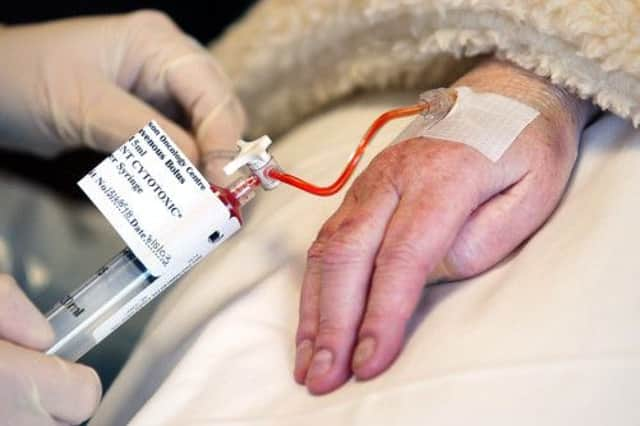Warning that half of Scots will get cancer


Recent figures for Scotland predicted that the lifetime risk of developing cancer stood at two in five, compared to previous estimates of one in three.
But the charity Macmillan Cancer Support said it now predicted that by 2020, 47 per cent of people in the UK will be diagnosed with the disease at some point in their lives.
Advertisement
Hide AdAdvertisement
Hide AdCases of cancer are rising as people are living longer and not dying from other causes, with deaths from conditions such as heart disease and stroke declining.
Macmillan said improvements in cancer treatment also meant fewer people were dying from the disease.
However, the charity warned that the stark rise in the number of people who get cancer and survive would put the health service under huge pressure with which it would be unable to cope without changes to how services for patients were provided.
Experts analysed existing data on cancer prevalence, incidence and mortality, and found that the proportion of people who will develop the disease at some point in their lives has increased by more than a third over the past two decades.
In 1992, 32 per cent of people who died that year had been diagnosed with cancer at some point in their lives and by 2010 this had risen to 44 per cent. The number who get cancer and do not die from the disease has increased by 67 per cent over the past 20 years.
In 1992, about one in five people who had been diagnosed with cancer ultimately died from another cause and, by 2010, this had risen to more than one in three.
Elspeth Atkinson, Macmillan’s director for Scotland, said: “The ageing population is the main reason behind rising numbers of people with cancer as people are dying less from other causes and living longer. The older you are, the higher your chances of being diagnosed with cancer.
“The rising incidence may also be due to the fact that we’re better at identifying cancers earlier.”
Advertisement
Hide AdAdvertisement
Hide Ad“Lifestyle factors, such as sun exposure causing an increase in skin cancer, may also play a part, but we haven’t looked in the detail of this in this research,” she said.
Ms Atkinson added the increases in incidence meant that the NHS and society generally faced a “Herculean challenge”.
“The NHS will not be able to cope with the huge increase in demand for cancer services without a fundamental shift towards proper aftercare, without more care delivered in the community, and without engaging cancer patients in their own health,” she said.
The charity said that though the survival trend was “encouraging”, there was growing evidence that many cancer patients do not return to full health after treatment and suffer serious side-effects of the disease.
“That we live longer as a nation and that we are improving cancer treatment are things to celebrate,” said Macmillan Cancer Support’s chief medical officer, Professor Jane Maher.
“We do, however, need to add a serious note of caution: the more successful we are with treatment and cure, the more people we have living with the long-term effects of cancer and its treatment.
“Many patients can be left with physical health and emotional problems long after treatment has ended. People struggle with fatigue, pain, immobility, or an array of other troublesome side-effects.
“We need to manage these consequences for the sake of the patient, but also for the sake of the taxpayer. We should plan to have more services to help people stay well at home, rather than waiting until they need hospital treatment.”
Advertisement
Hide AdAdvertisement
Hide AdMargaret Watt, chair of the Scotland Patients Association, said as more people developed cancer, the NHS had to be prepared to care for them.
She expressed concern patients were already having problems accessing some treatments. “We have an issue even now where patients can’t get access to certain drugs because the NHS won’t pay for them,” she said.
“In the future, we need to make sure that where a doctor believes a drug will benefit a patient that they get access to that treatment.”
A Scottish Government spokeswoman said it was important to note that survival rates from cancer had increased and this meant more people were living longer after diagnosis.
“We are determined to do more to meet the challenge of rising cancer rates, including that posed by the ageing population,” the spokeswoman said.
“We know that more lives can be saved in Scotland through earlier detection, as the earlier a cancer is diagnosed the greater the chance it can be treated successfully.
“This is why we have launched our Detect Cancer Early programme last year, which aims to increase the early detection of cancer and save even more lives.
“People can also reduce their risk of getting cancer by leading a healthier lifestyle.
“Small change such as stopping smoking, drinking less alcohol, taking regular exercise and eating a healthy diet can help reduce the risk of cancer.”